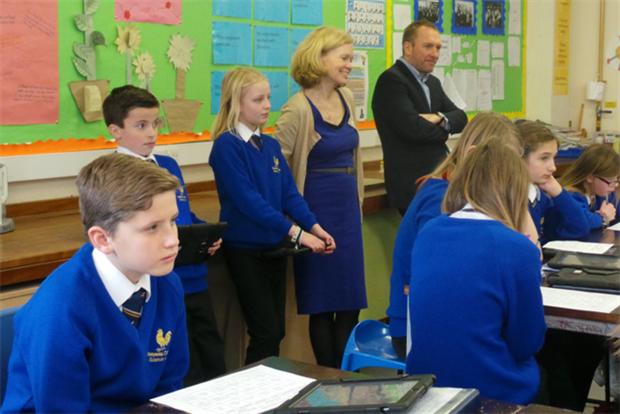
The government has for some time been working to encourage children to learn STEM (technology, engineering and maths) subjects. With a monumental burst in the rate of technology development coupled with a recovering economy and manufacturing sector, there is a fear that there will not be enough skilled workers to meet demand unless immediate action is taken.
If you need talent, you have a responsibility to nurture it
Brands are stepping into the arena to help address these societal issues. Engineering giant Siemens, for example, is ploughing millions into schools partnerships, sponsoring science fairs and sending staff within schools to help inspire a generation to learn these hard skills. It is investing a "seven figure sum" in the delivery of a three year programme called the Curiosity Project.
Siemens ultimately will gain from the partnership because the UK has a shortfall of engineers.
"The UK needs to double the number of engineers leaving university in order to fulfil the [growth of] the industry," says project lead Lee Dryden.
"There's been a legacy of us inspiring children to become engineers - engineering is at the heart of what we do and without them we simply wouldn't make the innovations we need."
Businesses, he argues, should support the education system. "If you need talent to support you in the future, you have a responsibility," he says.
Brands have a responsibility
The benefit of the investment is clear for Siemens: "Great innovation comes from great minds." And as a 71.9bn Euro multinational giant, it needs both great minds and innovation to drive the business forward in a recovering economy.
Children of school age are an important audience for businesses and working with schools, colleges and universities can provide a good platform for brands to fulfil CSR targets and engage with young consumers. But critics say schools are a place for academic education - not commercial exploitation.
Teachers aren't always welcoming of commercial backed school programmes and brands must navigate a healthy dose of scepticism. It can be a controversial subject - with the government on the one hand taking steps to protect children from commercialisation, and on the other hand, beckoning brands in the classroom through an open door.
Dryden admits there can sometimes be reservations and that brands must "respect the cynicism [teachers] may have" in creating relevant, deliverable partnerships. They must navigate potential reputation risk.
Sam Mercer, director at consultancy Hopscotch argues partnerships are mutually beneficial. She says appetite among teachers has been gaining for the past two decades. By going into local schools businesses can connect with local communities in an organic way and can benefit from inspiring potential employees of the future, she says.
Partnerships can be mutually beneficial
There are also internal comms benefits through engaging employees in the delivery of programmes, who like to 'give back'.
Though Mercer doesn't point to cuts in education funding, there's also no doubt that with dwindling education budgets there is a resource vacuum to fill, making the classroom ripe for brands that approach schools in the right way.
Businesses like Tesco are stepping in and using technology to link farmers to classrooms to help put lessons about food into a real life context. It uses Google + and video conferences to help bring lessons to life in an innovative way- supporting practical learning while indirectly promoting the brand.
I - from rice paddies in India to cheese producers in the Yorkshire Dales.
Tesco clearly benefits from a brand trust perspective - showing the provenance of Tesco food - but the retail giant says these partnerships are primarily about giving back to society.
Barclays is another business that is ploughing cash into driving youth skills as part of its brand campaign. – it aims to help 11-19 year olds gain skills to help them transition into the workplace with lesson plans, workshops and resources around work skills, people skills and money skills.
Partnerships support brand positioning
It promoted Life Skills with a £multimillion ad campaign - but where does the investment pay off for Barclays?
At launch, marketing chief Sara Bennison told Marketing Life Skills complemented a "broader more societal view" the bank was taking in its marketing strategy. It was a move away from "self congratulatory" advertising to build a more "authentic" brand message. It enables it to align the brand with social responsibility and giving.
"Barclays is a brand that has had significant – to put it mildly – reputation issues", she said. "The worst thing we could do is to put out an ad that talks about how marvellous we are, so we wanted to find a way to create advertising that isn’t self-congratulatory."
The programme for Barclays is about pinning its marketing campaign around supporting and nurturing talent at a grass roots level, supporting the economy in an era of "extraordinary societal change".
Times have moved on from the days where soft drinks brands could simply sample products in schools, warns Sam Mercer. And brands need to ensure they are adding genuine value by delivering teachers the lesson resources they need.
If the chord is struck right, the classroom can be a platform for brands to build trust, awareness and engagement and to build an "emotional connection" with young consumers, whilst also 'giving back'. But they must work within guidelines, creating "strong learning relevance."
"Schools are very receptive to brands going into schools as long as they are seen to be adding value. It’s not about overtly selling products or brands. It’s about common sense," says Mercer.
"From our point of view it’s becoming vital businesses get involved - its win/win."
Read next



.jpg)
.jpeg)
